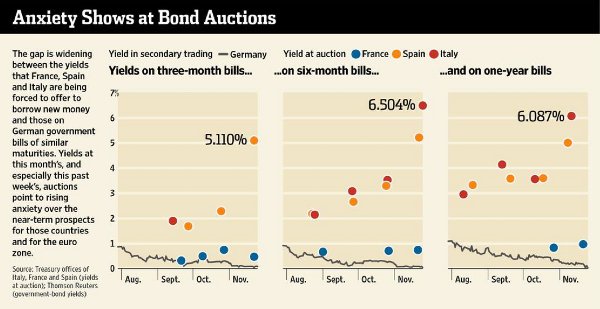Jean-Philippe Rameau’s compositions stand out as the epitome of Rococo style. His opera “Hippolyte Et Aricie” was the first work to which the term “Baroque” was applied. The opera is based on Racine’s play Phedre (dated 1677) with elements of the tragedies of Euripides and Seneca. In Act Two, the king of Athens, Theseus (you may call him Gerfran in our story) journeys to Hades and confronts Pluto. As he departs Hades, he is told that he will face hell in his own home.
Through a series of misunderstandings he will end up cursing his son Hyppolytus (Act three) while Theseus’s wife Phedre kills herself (Act four). We will leave act five for another commentary, but at this stage we will state that as the Euro zone descends to Hades while the crisis hits its main core economies, it faces hell in trying to save Italy, Spain, Belgium, with short-term yields in those countries more than doubling in just a month (see figure below). As Theseus departs his eye catches the view of a prince held in the Underworld. Pluto says that he is prince Enkidu (called ECB in our version of combined stories) who rules seventeen nations. Theseus has other major fires to put out rather than trying to get involved with prince Enkidu.
Borrowing from Keynes we will simply echo his words that the most certain way to overturn the structure and institutions of a country (or a bloc of countries) is to debauch its currency. Keynes in turn was echoing Lenin and his efforts to overturn the capitalist system.
Fiat currencies around the globe have been seeking immortality, like king Gilgamesh in the epic story coming from Mesopotamia.
King Gilgamesh – as the story tells us – was able to overturn all efforts by the gods to dethrone him. Hence, he lured Enkidu to be his best friend (when Enkidu had envisioned replacing Gilgamesh). Now the city of Uruk was ruled by both of them (it’s like having more than one fiat currency ruling international trade and finance). As the story unfolds, Gilgamesh and Endiku killed the monster Humbaba – sent by the gods – and the gods get angrier. The gods try again to trick them by sending the goddess Inanna to seduce Gilgamesh, who ends up rejecting Inanna. Innana (could it be those who do not like the prominent positions of the two main reserve currencies?) decides to take matters into her own hands, and kills Enkidu with a fever sending him to Hades which is ruled by the dread queen of the Underworld (or by some by Pluto).
Gilgamesh gets distraught, and he realizes that he could also die. Gilgamesh starts searching for the secret of immortality. Hence, he decides to ask the goddess Siduri about Utnapishtim, the only known survivor of the Great Flood, who told the king about Arks and boats of survival, but also about a plant at the bottom of a lake in the Underworld which is capable of granting immortality.
Gilgamesh travels to Hades, where Theseus too is visiting at the same time. Theseus wanting to get back home to his kingdom in Athens to save his household, expresses happiness about the possible release of Enkidu by Gilgamesh, but has no time for a joint journey (a.k.a. Euro bonds) to find the plant of immortality.
Gilgamesh dives in and finds the plant. Immortality he thought was achievable. His motives were by now noble. He wants to share the plant with his people. On his way back to Uruk, he stopped for a bath at a lake. All of a sudden, a snake came out and ate his plant. Gilgamesh returned to Uruk a desolate man having lost his friend, unable to reconnect with king Theseus, and permanently losing his chance of immortality.
Will we see this play out in modern times? Only time will tell. One should assess the appropriateness of one’s holdings in this environment.
Ode to arks, but woe to snakes!

